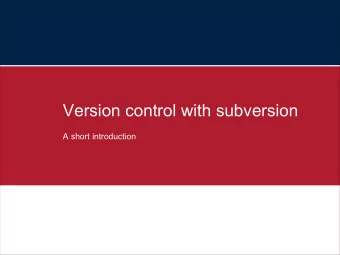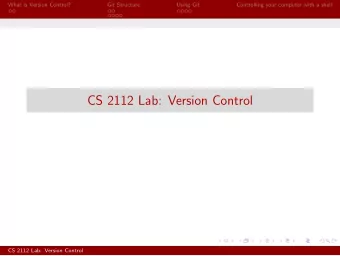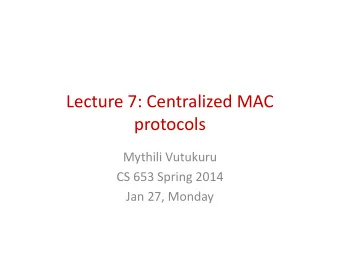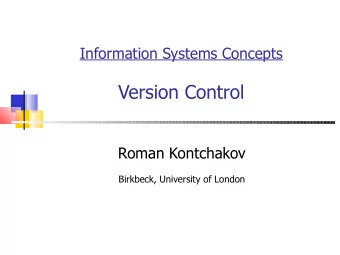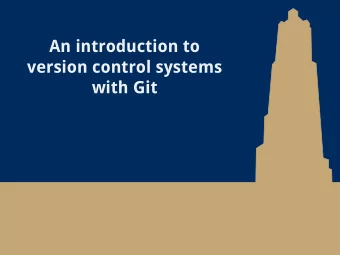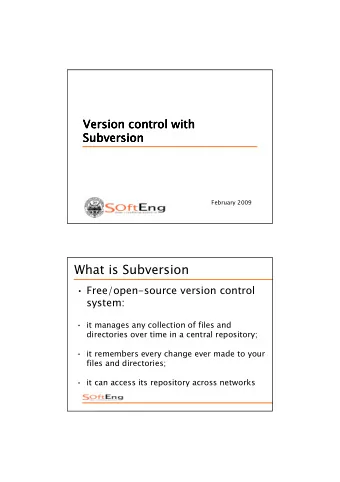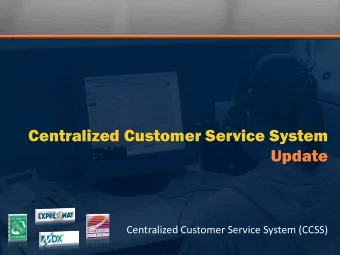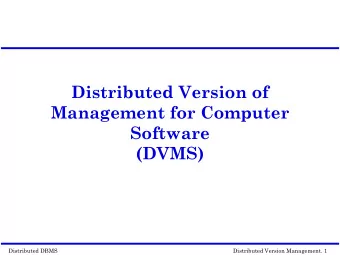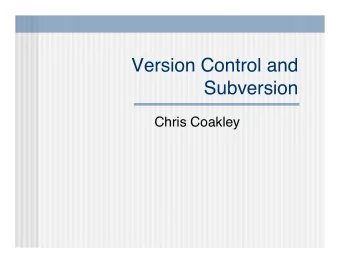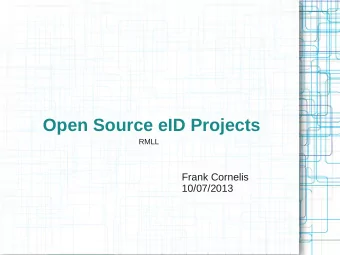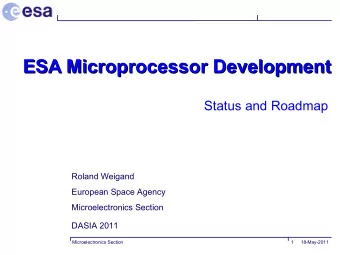
How Do Centralized and Distributed Version Control Systems Impact - PowerPoint PPT Presentation
How Do Centralized and Distributed Version Control Systems Impact Software Changes? Caius Brindescu Mihai Codoban Sergii Shmarkatiuk Danny Dig 1 GitHub is the main forge for OSS projects SourceForge GitHub 300K repos 4.6M repos 2
How Do Centralized and Distributed Version Control Systems Impact Software Changes? Caius Brindescu Mihai Codoban Sergii Shmarkatiuk Danny Dig 1
GitHub is the main “forge” for OSS projects SourceForge GitHub 300K repos 4.6M repos 2
What’s the difference? Git SVN History Local to every user On the server Commits Private, local Centralized, public Branching and Cheap Expensive merging History Modifiable “Set in stone” 3
What’s the difference? Git SVN History Local to every user On the server Commits Private, local Centralized, public Branching and Cheap Expensive merging History Modifiable “Set in stone” 3
What’s the difference? Git SVN History Local to every user On the server Commits Private, local Centralized, public Branching and Cheap Expensive merging History Modifiable “Set in stone” 3
What’s the difference? Git SVN History Local to every user On the server Commits Private, local Centralized, public Branching and Cheap Expensive merging History Modifiable “Set in stone” 3
What are we missing? Developers Managers Researchers Tool Builders 4
What are we missing? Developers Managers Researchers Tool Builders 4
What are we missing? Developers Managers Are they using the tools to their full potential? Researchers Tool Builders 4
What are we missing? Developers Managers Are they using the tools to their full potential? Researchers Tool Builders 4
What are we missing? Developers Managers Are they using the tools to Is switching to Git good? their full potential? Researchers Tool Builders 4
What are we missing? Developers Managers Are they using the tools to Is switching to Git good? their full potential? Researchers Tool Builders 4
What are we missing? Developers Managers Are they using the tools to Is switching to Git good? their full potential? Researchers Tool Builders How does this new paradigm affect mining software repositories? 4
What are we missing? Developers Managers Are they using the tools to Is switching to Git good? their full potential? Researchers Tool Builders How does this new paradigm affect mining software repositories? 4
What are we missing? Developers Managers Are they using the tools to Is switching to Git good? their full potential? Researchers Tool Builders How does this new Are they building the right paradigm affect mining tools? software repositories? 4
Survey 820 participants 5
Survey 820 participants 56% have over 10 85% from industry years experience 51% work in teams of 6 or larger 5
Repository Analysis 132 repositories 358K commits 409M LOC 6
Repository Analysis 52 SVN 51 Git 29 Hybrid 358K commits 409M LOC 6
Git is the most used VCS 60% 53% 45% 30% 20% 15% 12% 9% 1% 5% 0% MS TFS CVS Git SVN Hg Other 7
We identified 3 themes 1. Impact of VCS on developer’s behavior RQ 1: Does the type of VCS affect the size of commits? RQ 2: Do developers split their commits into logical units of change? How do they do it? RQ 3: How often and why do developers squash their commits? RQ 4: Why do developers prefer one Version Control System over another? RQ 5: Does the VCS influence the frequency with which developers commit? 2. Impact of the team size on the VCS RQ 6: Does team size affect the choice of VCS? RQ 7: Are larger teams more likely to use Issue Tracking Systems (ITS)? RQ 8: Does team size affect the size of commits? RQ 9: Does team size influence commit squashing? 3. Impact of the VCS on the software process RQ 10: Does the type of VCS influence the presence and the number of issue tracking labels (ITL)? RQ 11: Is there a correlation between the number of ITLs in the commit message and the commit size? RQ 12: How does the size of commits vary in time? 8
We identified 3 themes 1. Impact of VCS on developer’s behavior RQ 1: Does the type of VCS affect the size of commits? RQ 2: Do developers split their commits into logical units of change? How do they do it? 2. Impact of the team size on the VCS RQ 3: How often and why do developers squash their commits? RQ 6: Does team size affect the choice of VCS? RQ 4: Why do developers prefer one Version Control System over another? RQ 7: Are larger teams more likely to use Issue Tracking Systems (ITS)? RQ 5: Does the VCS influence the frequency with which developers commit? RQ 8: Does team size aff RQ 9: Does team size influence commit squashing? 3. Impact of the VCS on the software process RQ 10: Does the type of VCS influence the presence and the number of issue tracking labels (ITL)? RQ 11: Is there a correlation between the number of ITLs RQ 12: How does the size of commits vary in time? 8
RQ1: Does the type of VCS affect commit size? SVN Git 42 40.06 31.5 For Git and SVN the LOC difference was 23.20 21 statistically significant 10.5 0 Mean 9
RQ1: Does the type of VCS affect commit size? “Git promotes the idea that your commit space is not inflicting pain on anybody else […] it promotes small frequent commits […] rather than the 5pm commit” 10
RQ1: Does the type of VCS affect commit size? Hybrid-SVN Hybrid-Git 26 25.72 23.02 19.5 For repositories that transitioned, there was LOC 13 no statistically significant difference 6.5 0 Mean 11
RQ1: Does the type of VCS affect commit size? Git repositories have commits size 34% smaller than SVN repositories, in terms of LOC 12
RQ1: Does the type of VCS affect commit size? Git repositories have commits size 34% smaller than SVN repositories, in terms of LOC One possible explanation is that each developer commits to their own local repo, with no need for synchronization or merging their changes. Hybrid repos keep the same commit size because of existing policies. 12
RQ1: Does the type of VCS affect commit size? Git repositories have commits size 34% smaller than SVN repositories, in terms of LOC One possible explanation is that each developer commits to their own local repo, with no need for synchronization or merging their changes. Hybrid repos keep the same commit size because Old habits die hard of existing policies. 12
Implications Smaller commits makes it easier to “bisect” the tree Git offers better tools for splitting commits Some repositories migrate from one paradigm to the other; this might bias the results Changing the VCS is not enough 13
RQ2: Do developers split their changes? Separating the changes to the working copy into multiple, separate commits file1.txt file1.txt file2.txt ! file2.txt ! file3.txt file3.txt 14
RQ2: Do developers split their changes? Separating the changes to the working copy into multiple, separate commits Commit 1 file1.txt Commit 2 file2.txt ! file3.txt 14
RQ2: Do developers split their changes? Split their changes Group their changes Other 6% 6% 100% 27% 13% 81% 75% 68% 50% 25% 0% SVN Git 15
RQ2: Do developers split their changes? Split their changes Group their changes Other 6% 6% 100% 27% 13% “[changes] should be logically separated to 81% 75% easily allow [the] commit message to drive [the] 68% review” 50% 25% 0% SVN Git 15
RQ2: Do developers split their changes? By implementation By issue Policy Other 100% 11% 12% 5% 6% 62% 45% 75% 50% 37% 25% 22% 0% SVN Git 16
RQ2: Do developers split their changes? By implementation By issue Policy Other 100% 11% 12% 5% 6% 62% 45% 75% “[Git] gives useful tools for splitting or merging commits” 50% 37% 25% 22% 0% SVN Git 16
RQ2: Do developers split their changes? 76% of developers split their commits. The percentage is higher for Git (81.25%), compared to SVN (67.89%). 17
RQ2: Do developers split their changes? 76% of developers split their commits. The percentage is higher for Git (81.25%), compared to SVN (67.89%). We attribute this to an easier commit process. 17
RQ2: Do developers split their changes? 76% of developers split their commits. The percentage is higher for Git (81.25%), compared to SVN (67.89%). We attribute this to an easier commit process. Overall, developers choose to split their commits based on the issue they belong to. 17
RQ2: Do developers split their changes? For Git, more users (37%) split changes based on implementation details that in SVN (22%). 18
RQ2: Do developers split their changes? For Git, more users (37%) split changes based on implementation details that in SVN (22%). “Each commit is one cohesive change […] (like ‘sphere class can now calculate its own volume’) - user level features usually take many commits.” 18
Implications Doing this makes it easier to perform other operations such as cherry-picking . 19
Implications Doing this makes it easier to perform other operations such as cherry-picking . For mining software repositories, Git might be better since it allows smaller atomic changes . Splitting changes is a manual and tedious process . Tool builders could make their tools support this process 19
RQ3: Why do developers prefer one VCS over another? SVN Git 50 46% 42% 42% 37.5 25 23% 20% 12.5 11% 9% 1% 5% 2% 0 Killer features Old habit Ease of use Personal pref. Other 20
Recommend
More recommend
Explore More Topics
Stay informed with curated content and fresh updates.
